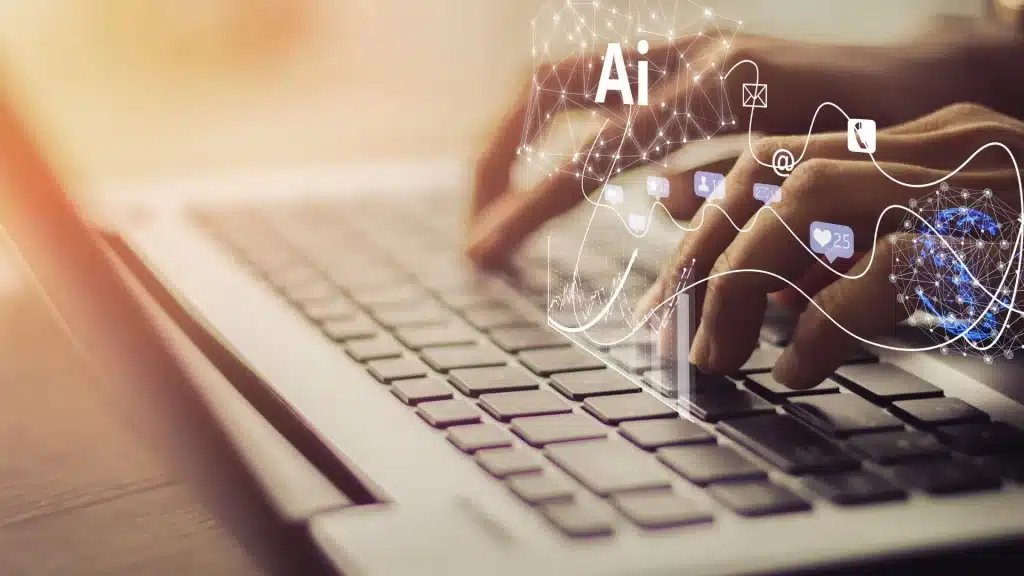HR leaders are interested in understanding and experimenting with HR artificial intelligence to reduce resource-intensive processes, eliminate repetitive tasks, or even co-author HR content and documentation.
AI is offering innovative tools to the HR industry to improve efficiency, streamline processes, and enhance the employee experience. From automating repetitive tasks to recruiting talent, AI is a strategic asset for companies that want to stay competitive.
Gartner predicts that generative AI solutions will be integrated into existing and new HR technology vendors in the next one to three years. Within HR technologies, generative AI may first emerge in the natural language processing (NLP) space, with examples including virtual assistants, chatbots, and unstructured data processing tools.
How HR ARTIFICIAL INTELLIGENCE is used in the company

Artificial Intelligence is increasingly integrated into business processes, radically transforming the way companies operate. According to the McKinsey study “Empowering people to unlock AI full potential”, the potential of AI could generate a value of 4.4 trillion dollars in productivity growth. However, despite 92% of companies increasing investments in AI, only 1% believe they have reached maturity in adopting these technologies.
The main gap is not related to technological availability, but to the slowness of leadership in driving this transformation.
In fact, employees use AI three times more than their managers imagine, with 70% expecting significant changes in their work within the next two years.
HR artificial intelligence, in particular, is being applied in multiple business areas, from the automation of repetitive tasks to personnel selection, from the personalization of the employee experience to predictive analysis of HR data.
However, one of the main obstacles remains training: 48% of employees consider training essential for AI adoption, but nearly half believe they do not receive enough support from their companies.
Millennials (35-44 years old), thanks to their greater familiarity with AI, can play a key role as agents of change, helping companies bridge the gap between technology and skills.
Finally, a crucial aspect is trust: 71% of employees trust their company to implement AI safely and ethically, more than they trust large technology companies or academic institutions. However, to ensure effective adoption, it is essential to balance speed and security, addressing challenges such as cybersecurity, privacy and the accuracy of AI systems.
According to a recent survey, employees are three times more likely to use AI tools than business leaders realize. This suggests that companies should invest in training to maximize adoption of these technologies.
HR PROCESS AUTOMATION
One of the main benefits of HR Artificial Intelligence is the automation of administrative and repetitive tasks, such as payroll management, shift scheduling, and attendance tracking. Thanks to chatbots and AI-based management systems, HR professionals can focus on more strategic tasks, reducing manual workload and minimizing errors.
In addition, AI technologies enable greater integration between different HR platforms, improving information management and transparency. According to the McKinsey study, full maturity in AI adoption is still a distant goal for most companies, but the growth potential is enormous.
Recruiting and TALENT ACQUISITION
HR Artificial Intelligence is transforming the recruiting process, making it faster and more effective. Machine learning algorithms analyze thousands of CVs in seconds, identifying the most suitable candidates based on predefined criteria. In addition, AI systems can conduct pre-selection interviews via voicebots or chatbots, evaluating candidates’ responses and assigning them a score based on their compatibility with the role.
The use of AI can promote fairer and more inclusive selection, eliminating unconscious bias in recruiting processes. Advanced models analyze applications without subjective influences, ensuring greater transparency and diversity in hiring.
Employee Experience OPTIMIZATION
AI enables personalized experiences for employees, improving their satisfaction and productivity. For example, HR Artificial Intelligence platforms can suggest training paths based on individual skills, provide support via virtual assistants, and collect real-time feedback to improve the work environment.
Even in the onboarding process, chatbots and HR AI Agents support the onboarding path of new resources, providing answers to frequently asked questions and in collecting necessary information and documents.
According to data collected by McKinsey, 48% of employees consider training the most important factor for AI adoption, while almost half believe they receive insufficient support from their companies. This highlights the need to implement targeted training strategies.
decISION MAKING WITH HR ARTIFICIAL INTELLIGENCE

Data analysis is essential to make informed decisions in HR. Thanks to HR AI, companies can monitor key metrics such as staff turnover, engagement levels and employee performance. Predictive systems help identify and analyze organizations’ internal soft skills and predict any critical issues, allowing for timely intervention.
Furthermore, with the increase in computational capacity and predictive models, AI can offer even more precise support for human resources management, allowing companies to make decisions based on concrete and proactive data.
HR ARTIFICIAL INTELLIGENCE CHALLENGES
According to a recent McKinsey study, artificial intelligence adoption in companies has reached 72%, a significant increase from 50% the previous year. However, despite the technological expansion, significant obstacles to the effective implementation of AI remain. One of the main ones is management resistance, often due to fears about change and perceived threats to existing jobs. Furthermore, the lack of clear implementation strategies can lead to fragmented initiatives and suboptimal use of the potential of AI.
To overcome these challenges, it is essential to invest in training and leadership development. An informed and proactive management is essential to drive digital transformation and foster a corporate culture open to innovation. Specific training on AI can help leaders understand the opportunities offered by these technologies and develop strategic plans for their effective integration. Furthermore, involving employees in the process of adopting AI, through initiatives such as dedicated internal hubs, can reduce resistance and foster acceptance of new technologies.
By adopting a strategic approach that combines targeted training and visionary leadership, companies can not only overcome the barriers to AI adoption, but also fully exploit its potential to achieve sustainable competitive advantages.
ConclusionS
HR Artificial Intelligence offers innovative solutions to automate processes, improve recruiting, personalize employee experience, and support strategic decisions. Companies that integrate AI into their HR systems can gain significant competitive advantages, improving both organizational efficiency and employee well-being. However, to get the most value from these technologies, a strong commitment from company leadership is essential, combined with continued investment in training and responsible adoption of AI.

